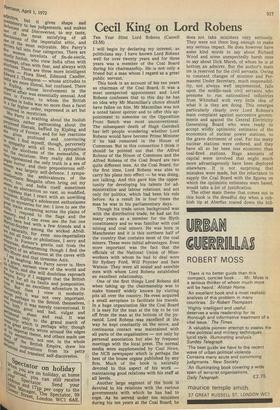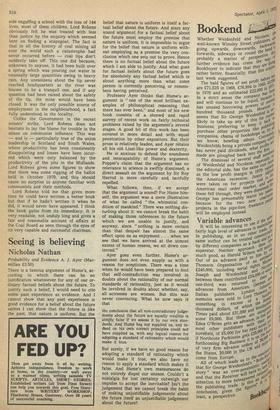Cecil King on Lord Robens
Ten Year Stint Lord Robens (Cassell £3.55) I will begin by declaring my interest, as politicians say. I have known Lord Robens well for over twenty years and for three years was a member of the Coal Board during his chairmanship. He is not only a friend but a man whom I regard as a great public servant.
This book is an account of his ten years as chairman of the Coal Board. It was a most unexpected appointment and Lord Robens confesses that to this day he has no idea why Mr Macmillan's choice should have fallen on him. Mr Macmillan was not a noted talent spotter and to offer this appointment to someone on the Opposition Front Bench was most unconventional. The subsequent death of Hugh Gaitskell has left people wondering whether Lord Robens would have become Prime Minister if he had remained in the House of Commons. But in this connection I think it should be pointed out that the Alfred Robens of the House of Commons and the Alfred Robens of the Coal Board are two quite different men. At the Coal Board, for the first time, Lord Robens was able to carry his plans into effect he was doing, not talking. And this gave him the opportunity for developing his talents for administration and labour relations, and not only for politics, which had been his role before. As a result he is four times the man he was in his parliamentary days.
Though his trade union background was with the distributive trade, he had sat for many years as a member for the Biyth constituency and so was familiar with coal mining and coal miners. He was born in Manchester and it is this northern half of the country that contains most of the coal miners. These were initial advantages. Even more important was the fact that the officials of the National Union of Mineworkers with whom he had to deal were Sir Sydney Ford, Will Poynter and Sam Watson. They were all sound and sensible men with whom Lord Robens established an excellent relationship.
One of the first things Lord Robens did when taking up the chairmanship was to make himself widely known by visiting pits all over the country. He even acquired a small aeroplane to facilitate his travels. In a huge organisation like the Coal Board it is easy for the man at the tap to be cut off from the man at the bottom of the pyramid. Lord Robens was excellent in the way he kept constantly on the move, and continuous contact was maintained with all parts of the organisation not only by. personal association but also by frequent meetings with the local press. The normal media were supplemented by Coal News, the NCB newspaper which is perhaps the best of the house organs published by any firm. Much of the book is naturally devoted to this aspect of his work maintaining good relations with his staff at all levels.
Another large segment of the book is devoted to his relations with the various governments with which he has had to cope. As he served under ten ministers
during his ten years at the Coal Board, he
does not take ministers very seriously. They were not there long enough to make any serious impact. He does however have some kind words to say about Richard Wood and some unexpectedly harsh ones to say about Dick Marsh, of whom he is at bottom an admirer. But the author's main ire is reserved for the civil servants. Owing to constant changes of minister and Permanent Under Secretary, much responsibility, not always well implemented, falls upon the middle-rank civil servants who presume to run nationalised industries from Whitehall with very little idea of what it is they are doing. This emerges particularly clearly over Lord Robens's main complaint against successive governments and against the Central Electricity Generating Board who were ready to accept wildly optimistic estimates of the economics of nuclear power stations, to the grave detriment of coal. Far too many nuclear stations were ordered, and they have all so far been less economic than coal-fired stations. Huge amounts of capital were involved that might much more advantageously have been deployed elsewhere. It is not surprising that mistakes were made, but the reluctance to supply the Coal Board with the figures on which the optimistic estimates were based, would take a lot of justification.
The other main theme that comes out in this book is the dreadful day when a rubbish tip at Aberfan roared down the hill side engulfing a school with the loss of 144 lives, most of them children. Lord Robens obviously felt he was treated with less than justice by the enquiry which seemed bent on finding a scapegoat. The fact is that in all the history of coal mining all over the world such a catastrophe had never occurred before — coal tips don't suddenly take off. This one did because, unknown to anyone, it had been built over a spring which was pouring out water in unusually large quantities owing to heavy rain. Any uneasiness about the tip never reached headquarters as the river was known to be a tranquil one, and if any question had been raised about the safety of the tip, the mine would have been closed. It was the only possible source of employment in the neighbourhood, a fact fully understood in the locality.
Unlike the Government in the recent miners' strike, Lord Robens does not hesitate to lay the blame for trouble in the mines on communist influence. This was — and is — particularly true of the union leadership in Scotland and South Wales, where productivity has been consistently disappointing and losses have been incurred which were only balanced by the productivity of the pits in the Midlands. Lord Robens gives some figures to show that there was some rigging of the ballot held in October 1970, and this should cause no surprise to anyone familiar with communists and their methods.
Lord Robens told me that given more time he could have written a better book but that if he hadn't written it when he did, it would never have appeared. I think the book gains from its immediacy. It is very readable, not unduly long and gives a fair and reasonable account of affairs at the Coal Board as seen through the eyes of its very capable and successful chairman.



































 Previous page
Previous page